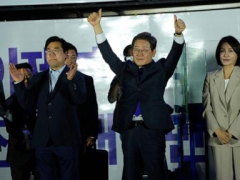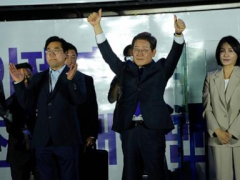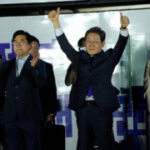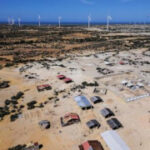SEOUL, South Korea — SEOUL, South Korea (AP) — Lee Jae-myung was a child laborer with an arm deformity. He attempted suicide. He later made his way through university and became a highly divisive politician who survived a stabbing attack and struggles with numerous criminal charges.
His turbulent life climaxed, as Lee, 60, the candidate of the main liberal Democratic Party, was elected as South Korea’s new president to succeed his conservative archrival Yoon Suk Yeol, who was ousted over his stunning imposition of martial law.
There are both hopes and fears about Lee’s win. Supporters think he’s an able leader who can get things done and fix the country’s deep-rooted economic inequality and corruption. But critics say Lee will likely oppress political opponents and intensify a domestic division.
Here’s a look at Lee, whose single, five-year presidency begins on Wednesday:
After graduating from an elementary school, Lee had to work at various factories in Seongnam, a city near Seoul, because his family couldn’t afford his secondary education.
At a factory manufacturing baseball gloves, he had his left forearm crushed by a press machine, getting a permanent arm disability. Lee said he suffered beating at his factories and hated encountering a girl who was a neighbor when he helped his garbage collector father’s work at a traditional market.
Despaired, Lee tried to kill himself twice, both unsuccessfully. He later got back on his feet and entered Seoul’s Chung-Ang University with a full scholarship, before he became a human rights lawyer.
“Hopes and ordeals always come together. The roles of ordeals are not getting people to surrender, but testing how serious and desperate their hopes are,” Lee said in a memoir published in 2017.
Lee later entered politics and became Seongnam mayor and governor of Gyeonggi province. Once a political outsider, Lee rose to prominence in 2016 after he made a series of fiery street speeches criticizing then conservative President Park Geun-hye, who was later removed from office over a corruption scandal.
“Let’s seize her with our hands and consign her to history,” Lee said during one rally in December 2016.
Many of his comments have since sharply polarized South Koreans.
Lee vilified South Korea’s conservative establishment as greedy “fake conservatives.” He slammed a U.S. missile defense system in South Korea as a source of tensions and likened strengthening U.S.-Japan ties to a 1905 Washington-Tokyo agreement that he said helped Japan colonize the Korean Peninsula later.
Lee’s proposal of giving a universal basic income to all citizens have invited accusations that he’s a populist.
In 2022, he lost the hotly contested presidential election to Yoon. In 2024, Lee was attacked by a man who told investigators that he wanted to kill Lee to prevent him from becoming president.
Recently, Lee has made few contentious or radical comments on foreign policy and security issues, and rather has promised to pursue pragmatic diplomacy.
He’s repeatedly described South Korea’s alliance with the U.S. as the foundation of the country’s foreign policy and stressed the need to maintain a trilateral Seoul-Washington-Tokyo security partnership.
“When it comes to what Lee said in the past, we don’t know whether he made such comments only to appeal to his supporters or whether they showed his true nature,” said Shin Yul, a politics professor at Seoul’s Myonggi University.
The major issues that Lee will immediately face is U.S. President Donald Trump’s trade war and other “America First” policies, and North Korea’s advancing nuclear p






